WARGAMES (1983)
A young hacker accidentally brings a nuclear defence system close to starting World War III...
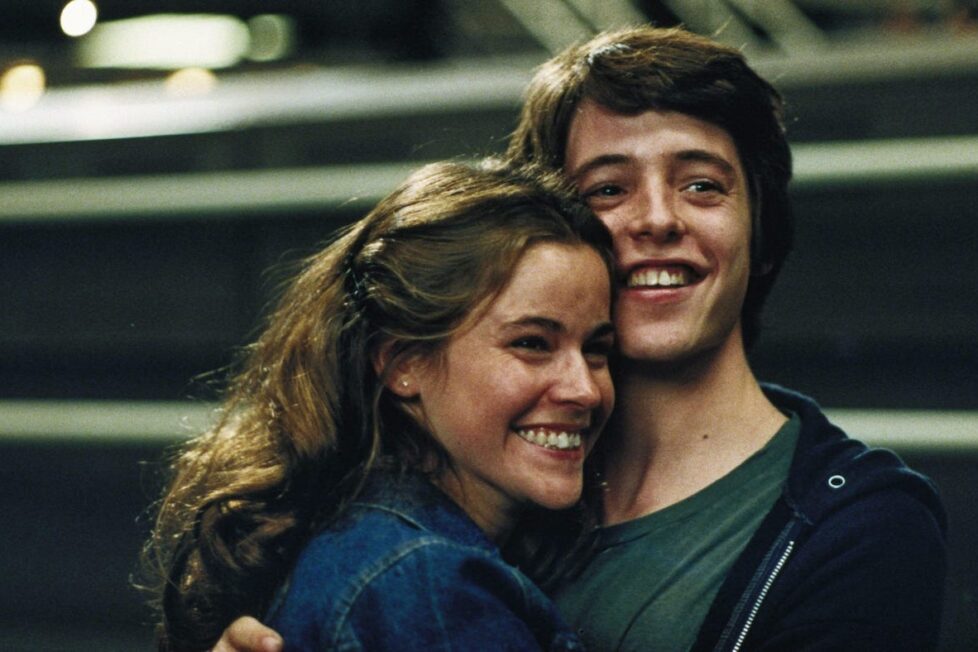
A young hacker accidentally brings a nuclear defence system close to starting World War III...


In 1983, the ABC television network in the US screened The Day After. Coming amid worsening US-Soviet relations and only days before the Soviet Union walked out of arms control talks, it was a powerful and explicit imagining of the effects nuclear war could have on ordinary citizens—and like the similar British-Australian production Threads a year later it remains disturbing, its slightly histrionic tendencies excusable given the subject and the time. President Reagan, watching it at Camp David, was shaken, writing afterwards it “left me very depressed”.
If the spectre of nuclear devastation was an unpleasantly familiar one by 1983, another development earlier that year was more novel: a group of Milwaukee-based computer hackers known as the 414s broke into an array of large computer systems, including that at Los Alamos National Laboratory (a site crucial in the development of the atomic bomb), making the cover of Newsweek and prompting a flurry of activity in Congress.
It was against this background—the resurgence of Cold War fears of mutually assured destruction, and the emergence into public awareness of the relatively new phenomenon of the hacker—that a film appeared in the summer of ’83 which looked, at first, like nothing more than a lightweight teen escapade. But WarGames is, in reality, both a surprisingly accurate portrayal of hacking (in big picture terms if not specific details) and a pointed, perceptive examination of another source of disquiet about nuclear weapons. Not their effects, as such, but the way in which an unstoppable nuclear exchange might start by accident.
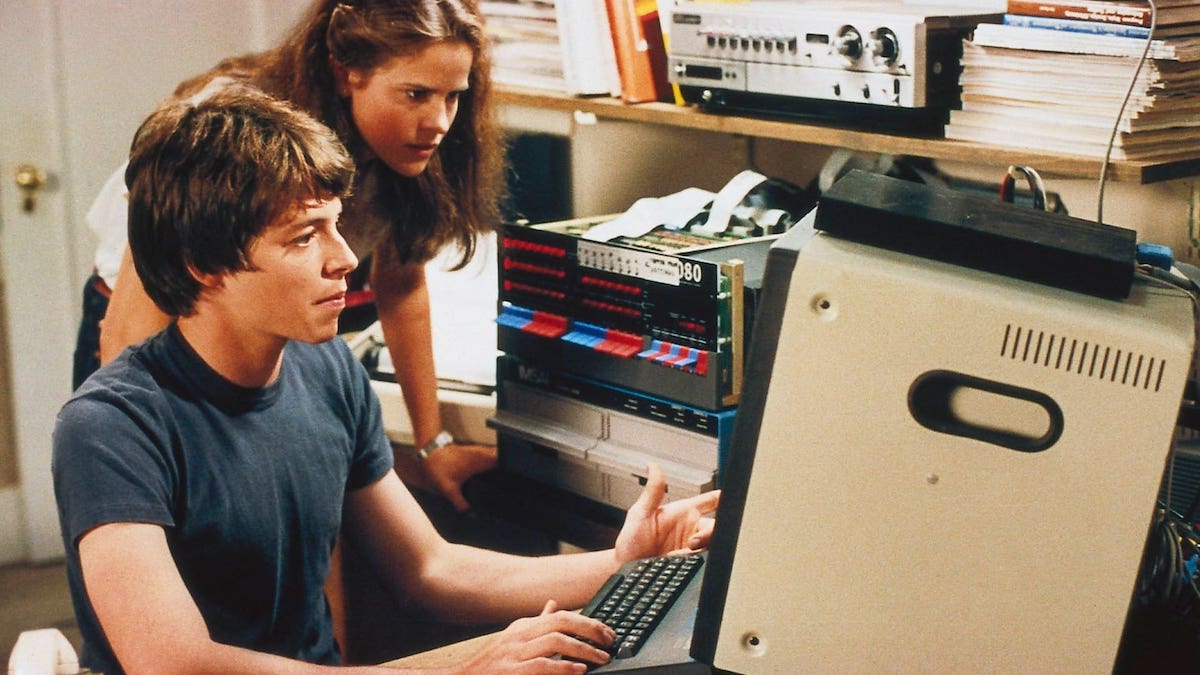
The logic of mutually assured destruction (MAD) had always carried this risk, particularly since the weapons had started to be carried on missiles as well as by bomber aircraft. Missiles could travel from the Soviet Union to the US (or vice-versa) so quickly that as soon as an incoming attack was detected, an equally—or even more—crushing response had to be launched.
Fail to do this and you run the risk that the enemy will destroy your launch sites before you can get your missiles in the air; allow that possibility and the delicate balance of deterrence collapses. Deterrence had, it was believed, kept the nuclear peace since 1945 precisely because neither side could use their bombs without suffering a similar onslaught. But it only worked if a counterstrike was guaranteed to happen.
This logic led, inevitably in a postwar era besotted by technology, to the idea of automating the nuclear response as much as possible. With that, though, came the risk that without human intervention an automated system could launch a “response” against a non-existent “attack” in error, leading quickly to an all-out exchange of missiles before there was a chance to step back from it—in effect, that systems (in the broadest sense) might take control.
The risk was illustrated by an incident a few weeks after the release of WarGames, when only the reluctance of a mid-ranking Soviet officer to believe erroneous reports from a satellite warning system prevented the Soviets from taking action. And it had already been treated cinematically, too. It was a source of black humour in Stanley Kubrick’s Dr Strangelove (1964) and of gripping drama in Sidney Lumet’s much straighter Fail Safe (1964), as well as forming the basis of Joseph Sargent’s Colossus: The Forbin Project (1970), an unaccountably near-forgotten little masterwork about the perils of A.I. (That film’s computer overruling humans also has something in common with the most famous in cinema history —HAL from Kubrick’s 1968 2001: A Space Odyssey).
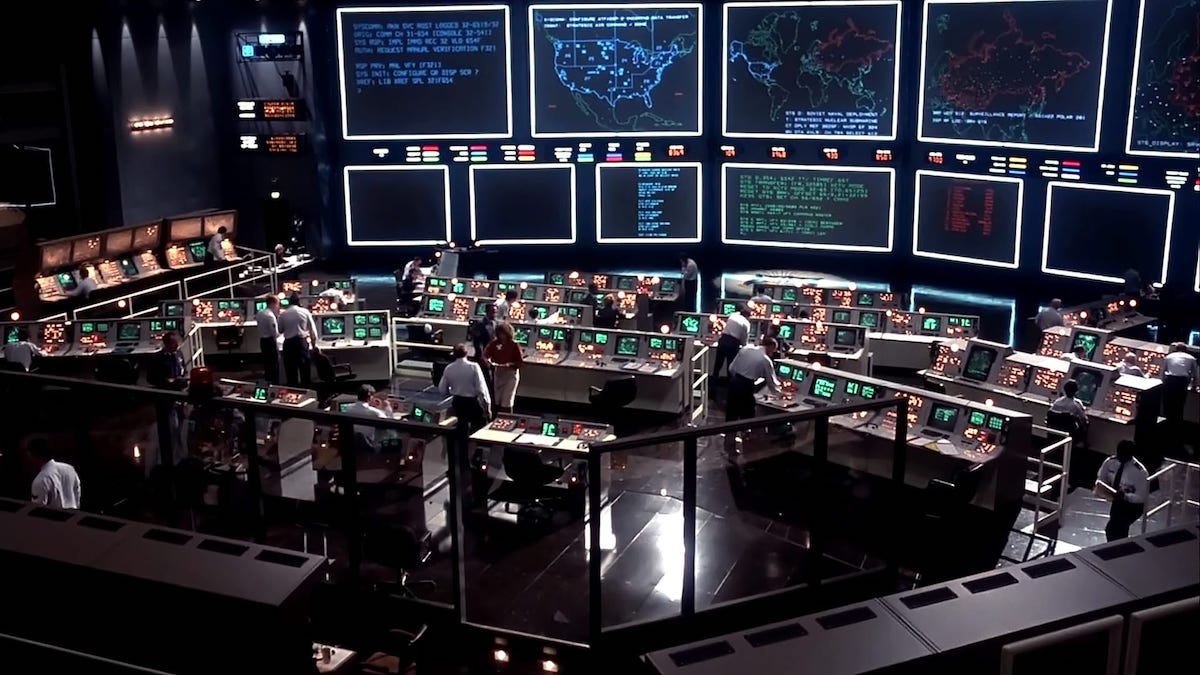
WarGames, however, opens by showing a scene of human fallibility—exactly the kind of weakness the champions of automation wanted to avoid. A worker in a nuclear command centre, Jerry (John Spencer), is seen discussing cannabis with a colleague, then an alert is received and a missile launch routine begins. It seems fairly realistic (interestingly, the Dymo label reading “gently” over the slot for a launch key also appears in The Day After in a slightly different setting, suggesting some basis in research) and perhaps equally realistic is Jerry’s view of sending off the bombs: “I want somebody on the goddamn phone before I kill 70 million people.”
It all turns out to have been a drill, but in a scene where military brass, their political counterparts and engineers discuss the outcome, it turns out that some 20% of the missile crew had—like Jerry—refused to launch. So their leaders decide to take the people out of the loop.
Says McKittrick (Dabney Coleman), one of the main proponents of automation: “In a real nuclear exchange, we can’t afford to have those missiles lying dormant in their silos because the missile commanders refuse to turn their keys when the computer tells them to.”
“You mean when the president orders them to,” another character observes, but the implication is clear, and indeed a system called WOPR (War Operation Plan Response) now takes over decision-making for the American deterrent. It’s programmed to run constant war games and learn from their outcomes.
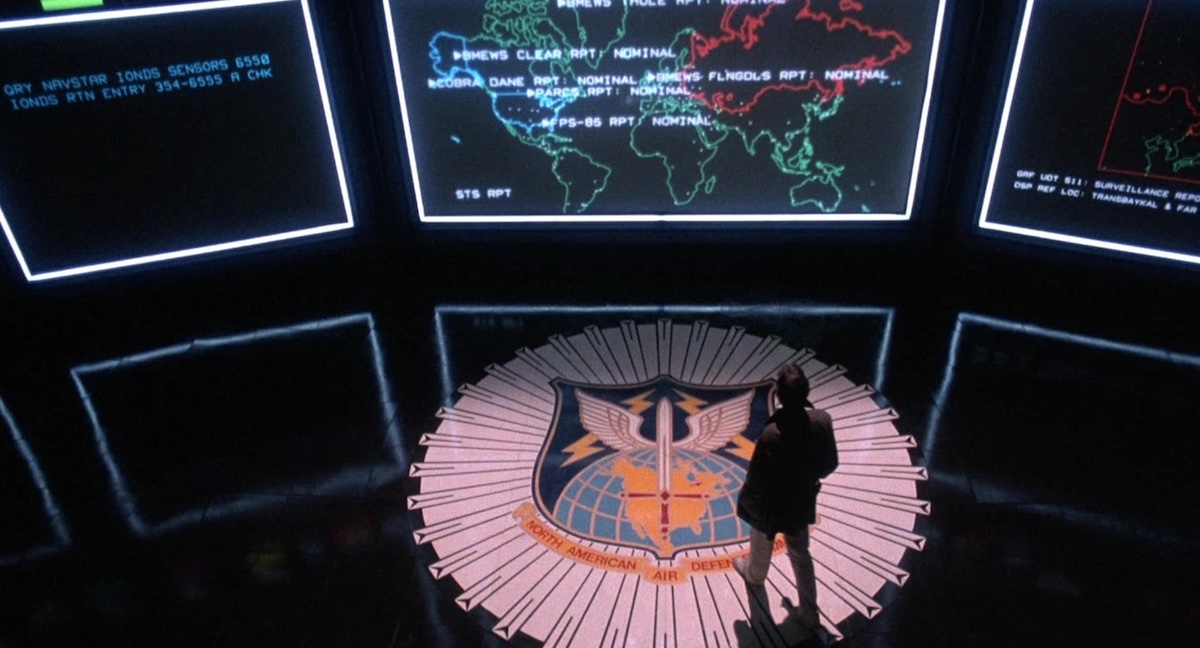
All this has, presumably, taken place sometime before the main action, which begins with the introduction of Seattle high-schooler David (Matthew Broderick). While WOPR is churning away at its war simulations deep in a Colorado mountain, we first see David reflected in the screen of another game, Namco’s arcade shoot-’em-up Galaga; the game shows shots fired and hit ratios, and the analogy to WOPR’s more deadly kind of warfare is clear, but still WarGames plays like a high-school movie for a while.
Though David will, when his hacking gets more serious, take advice from some stereotypical older nerds (Eddie Deezen’s Malvin is hilarious), for now, his interest in computers—still a hobbyist pursuit at the time—doesn’t preclude more typical teen priorities, including impressing Jennifer (Ally Sheedy). He hacks into the school computer to improve her grades, then into the Pan Am airline to make reservations for a flight to Paris as a romantic gesture.
WarGames indulges in a lot of info-dumping at this point but it’s reasonable enough, given the period, Many people didn’t use computers at all, few would have been aware of the hacking subculture, and fewer would even have known one could access a remote computer through a telephone line. And it is, at this point, purely matter-of-fact if a tiny bit naively awed when talking about hackers like David and the technology they use; there’s no cynicism beneath the surface. What you see is what you get.
By accident, looking for a game company, David gets into the WOPR nuclear defence system, unaware of what it is. He searches for “game”, finds “Global Thermonuclear War”, and begins to play. For quite a while, he and Jennifer believe it is merely a game they’ve connected to, in which they’re playing the Soviet Union while the computer takes the role of the US; completely oblivious to the panic they cause at the military command centre when the game is briefly misunderstood as real.
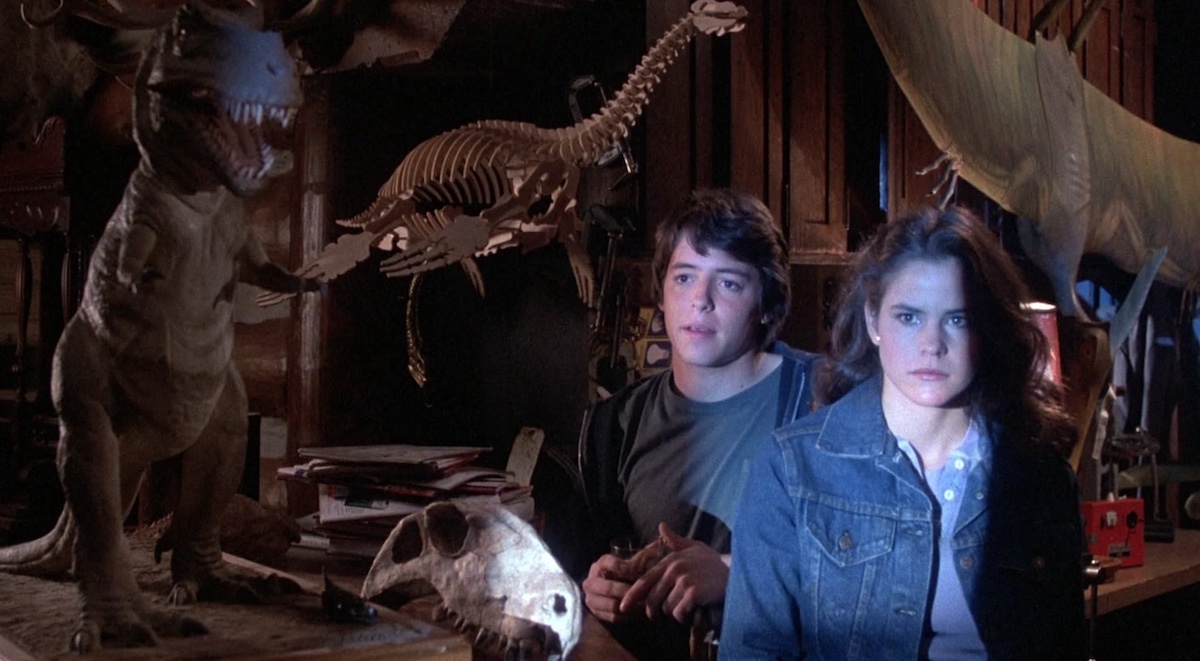
Again, here, it is people making the error. But WOPR has its own flaws: it can’t stop until the simulation is over and one side or the other has “won” and it doesn’t distinguish between simulation and reality. And so it continues to escalate the situation, creating false reports of Soviet aggression in an attempt to initiate an American response.
When these manufactured international tensions hit the TV news, the truth dawns on David. “Is this a game or is it real?” he asks WOPR. “What’s the difference?” it replies.
WarGames, up to this point a rather static film where the main storyline’s mostly consisted of David and the military commanders looking at their screens, now becomes more active as the authorities pursue David while he and Jennifer, in turn, pursue the now-retired inventor of the WOPR system—Falken (John Wood)—to figure out how to turn it off.
The film had a troubled background. Production had moved from Universal to United Artists, and then original director Martin Brest, who had lasted for only a couple of weeks of filming, left the project. John Badham, who had scored a major success with Saturday Night Fever (1977), was brought in to replace him and approached WarGames in a very straightforward manner. Direction and photography never draw attention to themselves and the narrative, which for much of the film alternates between David and Jennifer’s story and the events in the war room, is allowed to speak for itself, given urgency by WOPR’s countdown toward the time limit for its “simulation”.
Only toward the end does WarGames become more theatrical. Nuclear “impacts” on the huge screens of the war room are effectively rendered as giant white dots, filling the screens in near-silence; and then, when the computer is ordered to play Tic-Tac-Toe as well, the accelerating pace of these simulations builds to a climax, punctuated by repeated screen displays of “winner: none”, and leading to WOPR’s famous conclusion that “the only winning move is not to play”.

Just as modest as the direction, and as successful for that reason, are Arthur B. Rubinstein’s score (sometimes witty and suspenseful, even both at times, but generally a light-touch), and most of the acting. WarGames was the first big movie for both Broderick and Sheedy and both give likeable, credible, unmelodramatic performances as ordinary folk plunged into an extraordinary situation. Broderick, in particular, shows David maturing over the course of the movie, leading to his poignant reflection that “I wish I didn’t know about any of this. I wish I was like everybody else in the world, and tomorrow it would just be over. There wouldn’t be any time to be sorry…”
In the smaller roles, there are some stereotypes, including Barry Corbin’s good ol’ boy General Beringer and Irving Metzman’s balding, anxious scientist (though Beringer does have the best ironic line in the movie, telling Richter off for running in the war room—“somebody could get hurt”!)
The only problematic note is struck by Wood’s Falken, a character influenced by Stephen Hawking and John Lennon and also somewhat reminiscent of Jeff Goldblum’s Ian Malcolm in Jurassic Park (1993). Avuncular and a tad camp, first seen flying a radio-controlled pterodactyl, he’s too different in a film where the sheer normality of all the other characters adds so much to its credibility. He seems, also, to turn away too abruptly from his fatalistic acceptance that MAD will happen. “Nature knows when to give up,” he says. “You don’t care about death because you’re already dead”, David tells him.
WarGames fared well with both audiences and critics. It took fifth place in the worldwide box office charts, it was nominated for three Academy Awards (cinematography, sound and screenplay), and most reviews were positive. Roger Ebert called it “a scary and intelligent new thriller that is one of the best films so far this year”, adding “there’s not a scene here where Badham doesn’t seem to know what he’s doing, weaving a complex web of computerese, personalities and puzzles; the movie absorbs us on emotional and intellectual levels at the same time.”
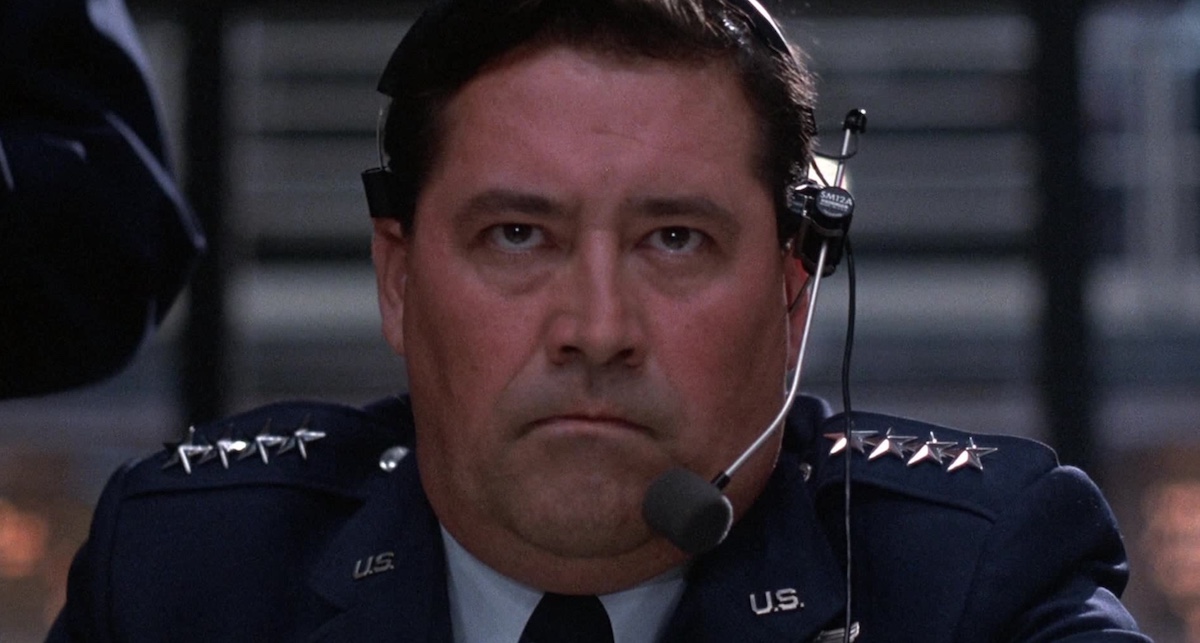
Even Pauline Kael, not at all easy to please, liked Broderick, Sheedy and their milieu. She saw the movie as a celebration of kids that “gives the impression of having been thought out in human terms”—although she was less impressed by the Falken character, and suggested that portraying senior military officers as unimaginative oafs was a lazy cliché (a fair criticism, despite Beringer being based on a real general).
Inevitably there were spin-offs from WarGames, including a tie-in videogame (several others, less closely related to the film, also came later), a novelisation by David Bischoff, and a terrible sequel called WarGames: The Dead Code (2008). It makes many references back to the original (e.g. “Global Thermonuclear War” appears on a computer menu, and star Matt Lanter even looks a bit like Broderick), but suffers from an overdose of adrenaline and a deficit of sense. Even the allusions to the earlier film are often mishandled! For example, the Lanter character repeats a trick that Broderick had used in 1983 to get free calls from a phone booth, but there’s no reason he’d need to.
And, whatever one feels about hackers—threats to stability or freedom fighters?—WarGames resonates. Google hosted a 25th-anniversary screening, but the hacker Kevin Mitnick, incarcerated more than a decade after the film’s release, claimed he was held in solitary confinement because WarGames had led the court to believe he was a danger to national security.
Certainly, the film isn’t only far more serious than it initially looks (the opposite of John Milius’s Soviet-invasion romp Red Dawn from the following year), but it was also ahead of its time in many ways. It wasn’t the first movie about hacking—there had already been Paper Man (1971) and Tron (1982), for example—but the way it put information technology at the centre of the story, evidenced right from the blocky pseudo-digital typography of the opening titles, was rare.
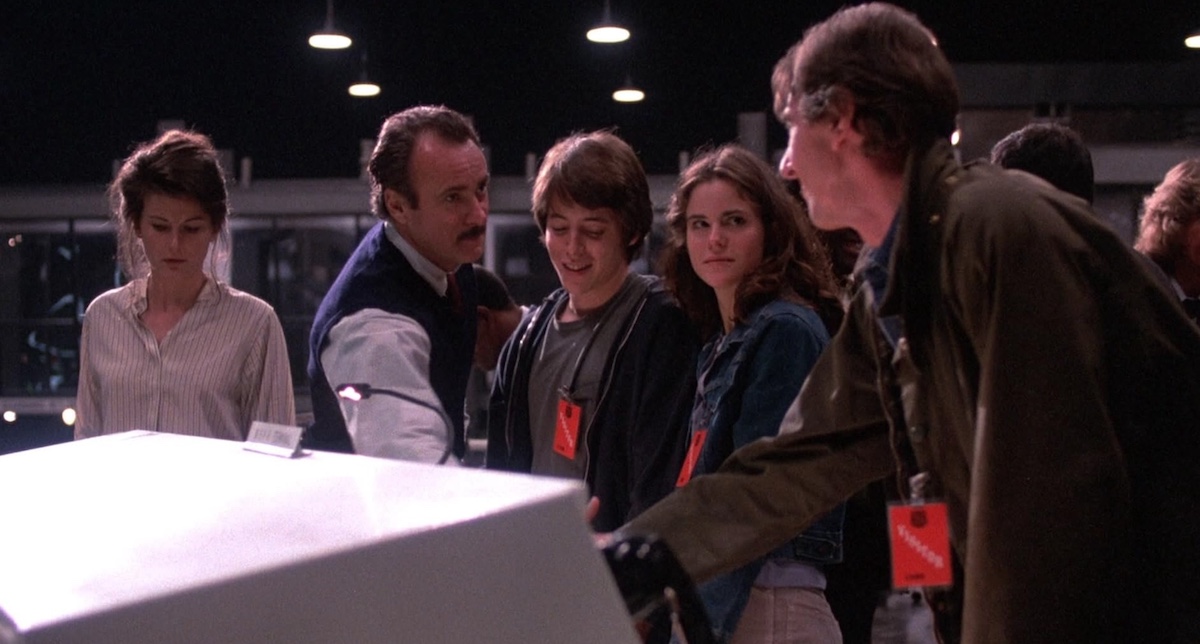
It was a while before sinister computers and hackers would become mainstream topics, in the likes of Terminator 2: Judgment Day (1991) or Hackers (1995), tet these ideas are so fundamental to WarGames it’s surprising to consider the original idea was for a movie about a young man’s relationship with an older genius (David and Falken, in effect), and not technology or war at all.
Once you get past now quaint-looking tech like the enormous floppy disks, and a few implausibilities (when David is detained by the authorities, would they really take him right into the NORAD Combat Operations Centre?) there’s much that remains relevant. Since the 2022 invasion of Ukraine we’ve become more aware again of nuclear war, of course, but we also now have “lethal autonomous weapons systems”—armaments that make their own decisions, more luridly known as “slaughterbots”—being deployed. And, of course, the safety of artificial intelligence has suddenly become a pertinent question.
Falken even uses the word “hallucination”, now applied to ChatGPT’s flights of fantasy, to describe fallacious reports of Russian missiles, and he might as well be advising us on how to approach AI when he tells Beringer: “General, you are listening to a machine… do the world a favour and don’t act like one.”
“The game itself is pointless,” Falken also says near the end, comparing mutually assured destruction to tic-tac-toe. Built into the very structure is the near-impossibility of either player winning.
The Day After would show what not winning looked like, horrifyingly, on the level of everyday lives. But it’s WarGames—a film which, if it were about adults rather than teens, might be even more widely recognised as the fine piece of cautionary cinema that it is—that showed how our attempts to gain an edge through technology could take us to a place where everyone loses.
USA | 1983 | 114 MINUTES | 1.85:1 | COLOUR | ENGLISH

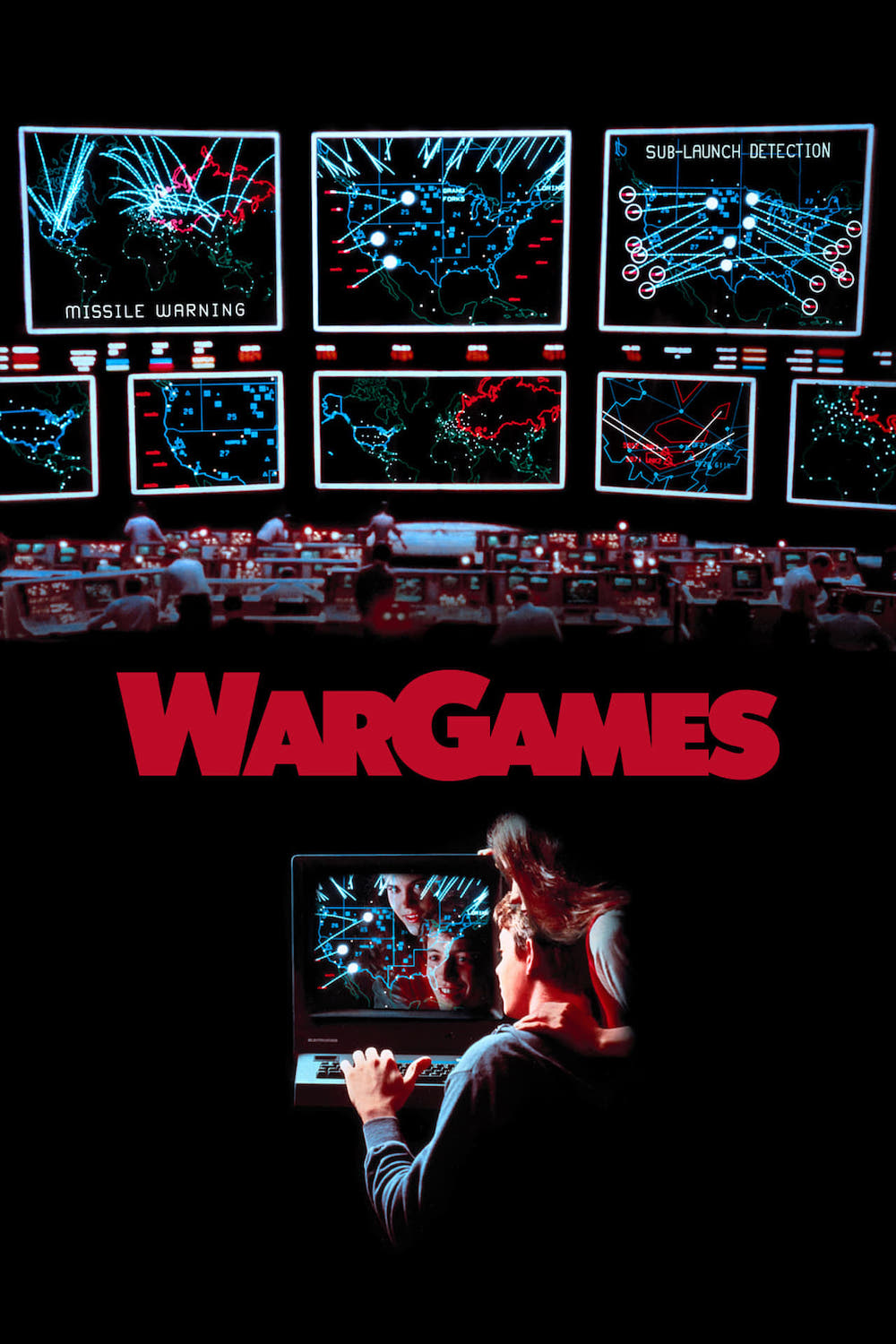
director: John Badham.
writers: Lawrence Lasker & Walter F. Parkes.
starring: Matthew Broderick, Dabney Coleman, John Wood, Ally Sheedy & Barry Corbin.
